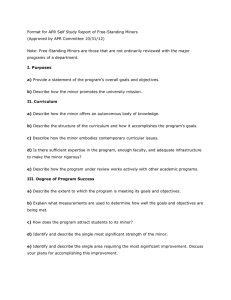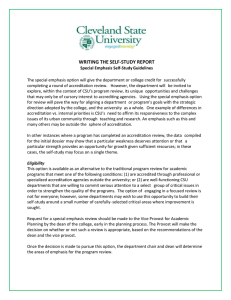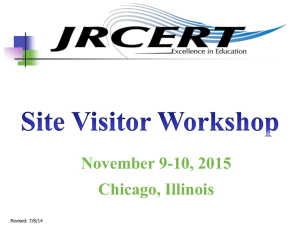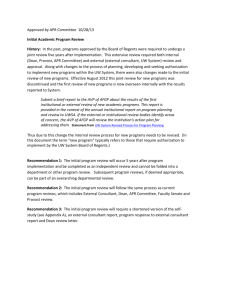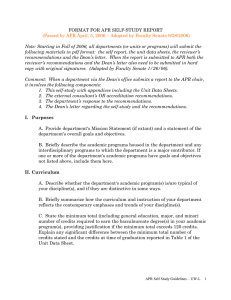Academic Program Review SUMMARY* Department under review: Radiation Therapy Program
advertisement
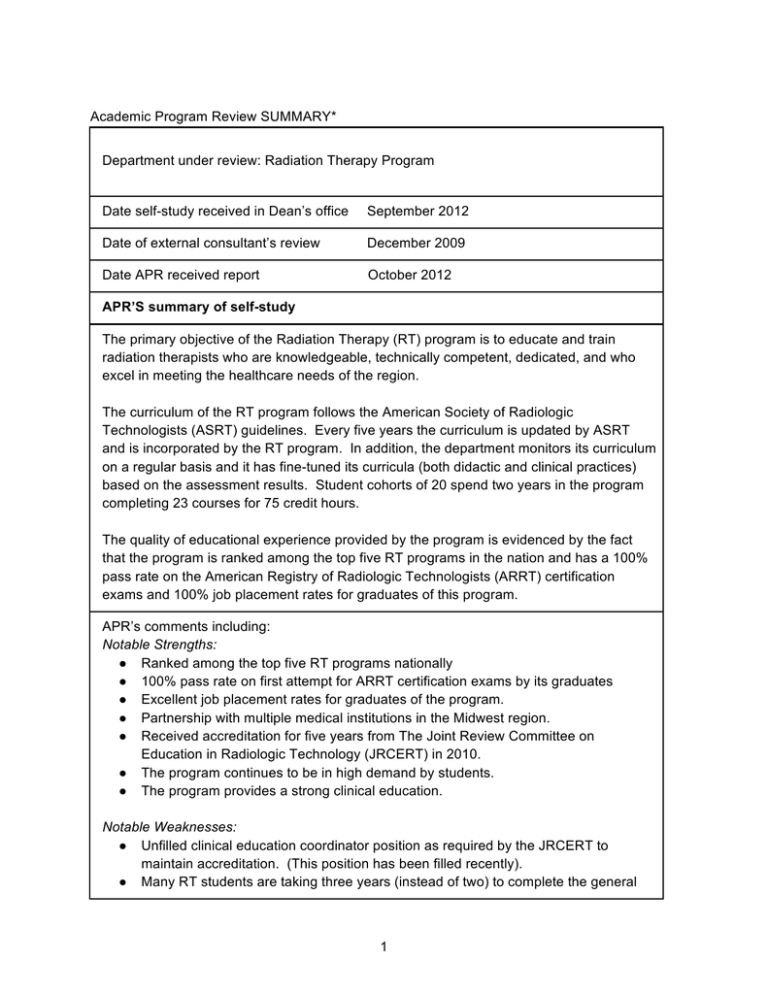
Academic Program Review SUMMARY* Department under review: Radiation Therapy Program Date self-study received in Dean’s office September 2012 Date of external consultant’s review December 2009 Date APR received report October 2012 APR’S summary of self-study The primary objective of the Radiation Therapy (RT) program is to educate and train radiation therapists who are knowledgeable, technically competent, dedicated, and who excel in meeting the healthcare needs of the region. The curriculum of the RT program follows the American Society of Radiologic Technologists (ASRT) guidelines. Every five years the curriculum is updated by ASRT and is incorporated by the RT program. In addition, the department monitors its curriculum on a regular basis and it has fine-tuned its curricula (both didactic and clinical practices) based on the assessment results. Student cohorts of 20 spend two years in the program completing 23 courses for 75 credit hours. The quality of educational experience provided by the program is evidenced by the fact that the program is ranked among the top five RT programs in the nation and has a 100% pass rate on the American Registry of Radiologic Technologists (ARRT) certification exams and 100% job placement rates for graduates of this program. APR’s comments including: Notable Strengths: ● Ranked among the top five RT programs nationally ● 100% pass rate on first attempt for ARRT certification exams by its graduates ● Excellent job placement rates for graduates of the program. ● Partnership with multiple medical institutions in the Midwest region. ● Received accreditation for five years from The Joint Review Committee on Education in Radiologic Technology (JRCERT) in 2010. ● The program continues to be in high demand by students. ● The program provides a strong clinical education. Notable Weaknesses: ● Unfilled clinical education coordinator position as required by the JRCERT to maintain accreditation. (This position has been filled recently). ● Many RT students are taking three years (instead of two) to complete the general 1 ● ● education and prerequisite courses. While there are many reasons for this, a primary concern is the non-availability of seats in BIO, CHM, and MTH courses during freshman and sophomore years. The program has an inadequate supply budget. Availability of clinical internship sites limits the number of students admitted to the program. APR comments on any/all of the six specific components of the self-study (if applicable) Self-Study: Purposes The primary objective of the Radiation Therapy program is to provide a high-quality education and training to students in the program by offering a broad-based curriculum in liberal studies, professional courses, and clinical internships. Self-Study: Curriculum The RT program at UW-L is an accredited 2 + 2 professional educational program housed within the department of Health Professions. Each year the program admits 20 students who have completed a minimum of 61 credits which includes general education and preprofessional courses required for admission to the program. During the first year, students complete 30 credits of course work in BIO, CST, HED, and PHY. During the second year (13 months) the students will complete 26 credits of RT-specific coursework and 19 credits of clinical practicum at clinical sites. In order to maintain national accreditation, the program has to follow ASRT guidelines and fine-tune its curriculum every five years. The curriculum developed is up-to-date, rigorous, and follows the trends of the professional field of the clinical practice of Radiation Therapy. Since the RT knowledge is constantly evolving, the course content is continually updated and revised each time the course is taught. Even though there is a high demand by the students to get into the program, the program can admit only 20 students per year. This is due to the non-availability of additional clinical internship sites. Self-Study: Assessment of Student Learning & Degree of Program Success Since the RT program is accredited by JRCERT, it is required to complete an annual program assessment plan as mandated by JRCERT. The outcomes are assessed at different times during the students’ six semesters in the program. The program also collects student learning outcomes and program effectiveness statistics. Several outcome indicators were evaluated from 2008-2010. These included: • Graduation rate, ARRT national certification exam results, graduate satisfaction, and employers’ feedback. Some of the highlights from the 2008-2010 results of the 2 • • • • • • • assessments are shown below: Final exam scores from all courses have an average > 85% Student outcomes on written assignments (research proposals, patient education projects, case presentations, clinical writing assignments, etc.) were met. Student retention rate was 95%. Pass rate on the ARRT national certification exam is 100%. 100% job placement for graduation within three months. High level of satisfaction expressed by graduates and employers. JRCERT visited UW-L RT program in 2009 and awarded five-year accreditation period. Self-Study: Previous Academic Program Review and New Program Initiatives This is the first ever UW-L academic program review for the RT program. However, the program was reviewed by the external accreditation agency JRCERT in December 2009. The program was evaluated according to the standards for an accredited educational program in radiologic science and was awarded accreditation for a period of five years. The JRCERT found one deficiency in the area of staffing. Due to the number of clinical affiliates of the program, the JRCERT standards require a 1.0 FTE clinical coordinator position. The Dean of the College of SAH has provided funding for this position and the position has recently been filled. Self-Study: Personnel The RT program consists of 2.0 FTE core faculty members including the full-time program director and a clinical education coordinator (recently hired). The clinical education coordinator will be responsible for teaching some of the courses (CST 354 Health Communication and HED 320 The US Health Care System) required for the RT program and currently offered by other departments on campus. This will allow for revising the courses and tailoring them to RT students specifically. The RT program is fully staffed in accordance with JRCERT standards. There is ample funding for the program director to attend national and local conferences and meetings. Self-Study: Support for Achieving Academic Program Goals (Resources) The RT program is housed in the Health Science Center. Each year the program admits 20 students only. The RT program is interested in increasing the enrollment but unable to do so because of lack of clinical internship sites. The RT program has adequate access to classroom space within the HSC and also has received access to the HSC radiography lab belonging to the radiography program at Western Technical College. The RT program would like to see increased funding for supplies and equipment to give 3 more hands-on experience to students in medical imagery before they begin their clinical internship. External Reviewer Recommendations APR’s Comments on External Reviewer (if applicable) The RT program was reviewed by the national accreditation agency JRCERT in December 2009. The accreditation site visit team listed one citation (non-compliance) in its findings (standard six): “objective G.3 – provides an adequate number of faculty to meet all educational programs, administrative, and accreditation requirements.” This concern was addressed when the program hired a clinical coordinator during 2011-2012. Department’s response to the Reviewer Recommendations APR’s Comments on the Department’s Response (if applicable) The RT program has been able to rectify the concern cited by the JRCERT. Dean’s Letter APR’s Comments on Dean’s Letter (if applicable) Dean Riley noted several strengths of the Radiation Therapy program with particular emphasis on the program’s success in developing skilled Radiation Therapists. He noted the one deficiency highlighted in the accreditation review by JCERT (the lack of a full-time clinical coordinator) and confirmed that this deficiency has been addressed. APR’s Recommendations (must be completed) Recommendations: Major: 1. Maintain accreditation status and 100% pass rate on first attempt for ARRT certification exam. 2. Maintain 100% placement rates (within six months of graduation). 3. Explore establishing new clinical sites to increase the program capacity contingent on market demand. No serious areas to address – review in 7 years □ Some areas to address – review in 7 years □ Some areas to address – department should submit short report on progress to Fac Senate/Provost’s Office in 3 years * APR’s report to faculty senate will consist of this completed form in electronic form. 4
